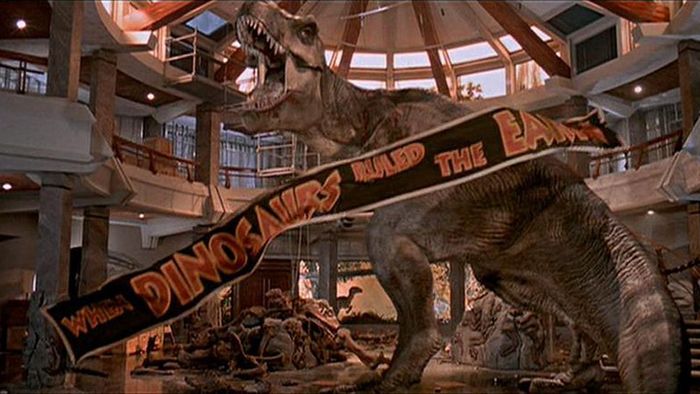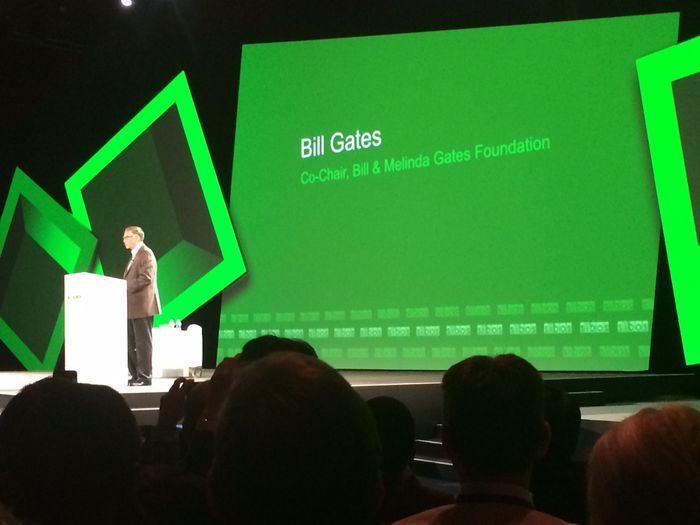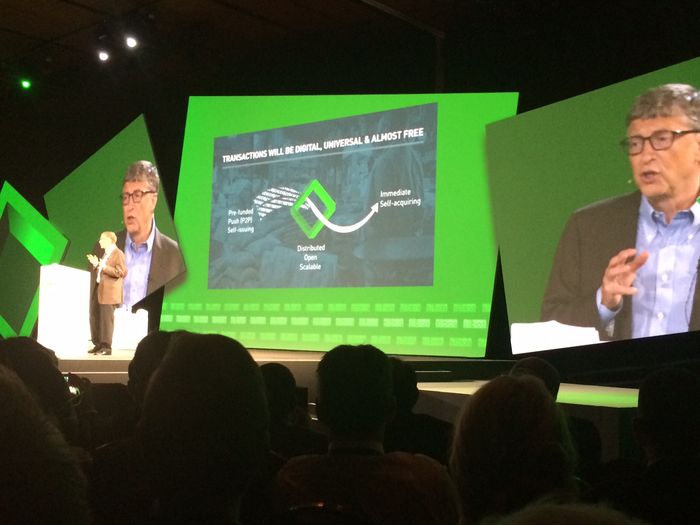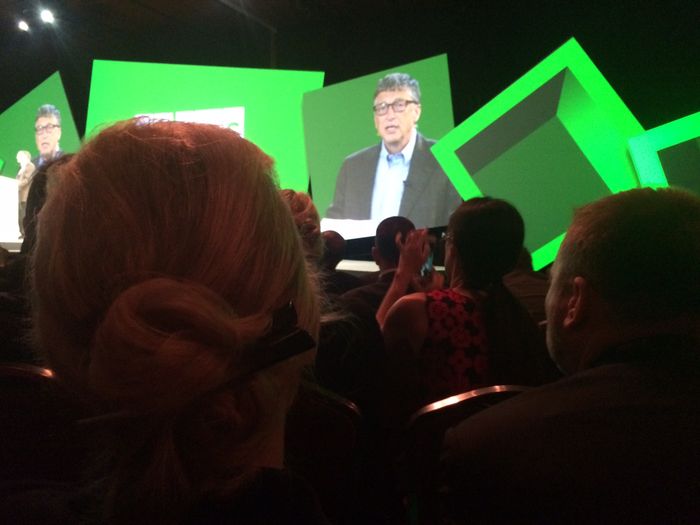
So SIBOS came to an end with an amazing packed hall full of bankers eager to hear the sage words of Bill Gates.
Bill Gates?
Isn’t the guy who once called bankers dinosaurs?
Yes, the very same. As Gottfried Liebbrandt, CEO of SWIFT, said in his summation: “we were very tempted to put up a sign saying ‘Welcome to Jurassic Park, Bill’.”
I wish SWIFT had as that would have looked great.

Instead, Bill was invited because he has seen the future, and it’s mobile.
Mobile changes everything. In particular, it changes the exchange of money between peoples thanks to digital payments, peer-to-peer, continent-to-continent.
That has been substantiated by the work of the Bill & Melinda Gates Foundation, his charitable trust, that has the goal “to help people in the world’s poorest regions improve their lives and build sustainable futures by connecting them with digitally-based financial tools and services”.
In fact, it goes further than this, with Bill predicting that there will be no more poverty in the world by 2035 in his annual letter this year:
I am optimistic enough about this that I am willing to make a prediction. By 2035, there will be almost no poor countries left in the world. Specifically, I mean that by 2035, almost no country will be as poor as any of the 35 countries that the World Bank classifies as low-income today, even after adjusting for inflation.
This is a prediction that is based upon financial inclusion allowing the poorest nations to save for their families and insure their crops; transfer money freely and easily and have everyone capable of being a merchant … and it’s all thanks to the digital revolution.
If you are interested in more, then you can read the report, but here’s a brief summary of his speech in my own words.

According to the World Bank, absolute poverty has halved in the last 25 years, as has the number of children dying under the age of five. In a large part, that is thanks to technology and the sharing of knowledge across the world through networked systems. It means we can track diseases and issues better, and ensure a better quality of care even in the poorest countries. But, with all that progress, we still have not made financial transactions work. Even though we can make financial transactions cheaply and easily, we do not. Yet. But that is the focus of our work today.
We can make digital transactions very inexpensive and easy, as the mobile telephone has become pervasive. Mobile telecommunications changes the game and what poor people need, to move out of poverty and into the middle class, is financial services. Giving people the ability to save and borrow raises the society to a higher status but, in order to do these things today, it is very inefficient and expensive.
Poor people saving today keep their cash at home where it earns no interest and can be easily stolen. As a result, the poorest people buy livestock and seeds, but do not insure them. That is why they get caught in a poverty trap, because they cannot get insurance to cover bad years of crops and production.
That is why my foundation focuses upon how to accelerate the availability of financial tools for the poorest. We did this carefully by looking at various options. For example, we could have focused upon microlending, but the overhead of costs would mean that the interest rates are too high. We could have focused upon savings and insurance but, in a pre-digital world, the paperwork and effort involved in revocation and repudiation services and such like would not make it viable in a pre-digital world. That is why we have decided to focus upon accelerating the use of digital platforms in the poorest economies of the world, for financial inclusion. Once they are there, it will be an opportunity for profit, and that is why we then also focus upon the applications.
Putting money aside for the family; protecting against bad weather years; and similar services are the simple digital mobile apps we are accelerating. Digital payment systems can do more for equity in poor countries than anywhere or anything else, so we aren't waiting for trickle down of these services from rich countries to poor, but we are creating them there first.
Now some would say: why don’t you just offer subsidies to support the poor, rather than investing in digitising their money? But subsidies don’t work, as the rich take those subsidies and the poor do not benefit. Without digital payments, we cannot target those payments efficiently without a corrupt middleman taking the riches before they reach those who need them. Digital payment systems are critical to our approach. The ability of computers to process data at low cost, through the cloud, makes these technologies cheap and easy.
For example, the many connections you will make in the future through the internet of things will digitally identify who you are at low cost. The cost of identity is now very low in this world, unlike in the past world, and digital payment services will be beneficial to all markets.
That is why services like Apple Pay for identity management and bitcoin using the blockchain to ensure the same transaction is not done twice, are revolutionary. These services do not require complex developments or technologies, it’s simple now, and the costs are insignificant.
That means the old way of having an id system out on its own, where you have to go to a branch and talk to a manager, is forgotten. That was the old expensive way. That's no longer the future way.

Another example is one of my favourite stories of two MIT graduates in Bangladesh, who decided to create a mobile money network in 2011 and already have 22 million customers. You see that sort of wild adoption thanks to the simplicity, ease and availability of mobile money services. These people have now got access to financial services, so much so that $1 billion a month - 10% of the GDP - is going through their mobile money network.
It starts with moving money - money transfer - that's just the bootstrap though as, very quickly, merchants realise they can accept those digital payments too. This means it soon becomes a digital currency.
There's now more going through the digital mobile currencies than in the real currency, as people are not cashing out but just transferring digital messages. Now all economies are trying to emulate these capabilities, like India, and over the next few years, this will become totally pervasive.
The transaction system is the first thing, then the people can be drawn into the economy. We anticipate two billion new customers will be brought into the formal economy using services that we take for granted, like building a credit record. Two billion new bank customers, who can also take out loans and mortgages, as well as saving and investing.
All of these digital records will be created, and it will make assessing an individual's credit risk far, far easier. This makes it easy for everyone to be entrepreneurs too, thanks to mcommerce. As a result, how we deal with billing and credit will change completely, and the pace of change is going to be fast. I would be surprised if mobile digital transactions are not pervasive in most countries by the end of this decade.
This is underpinned by mobile and digital however. It means that we don't want any people to go into a bank branch; if you can't do it through a mobile telephone, then it's not worth doing.
He said a bunch of other stuff, but I think you get the message and, in an amazingly packed hall, I thought they were all going to cheer at the end, as everyone took photos on their mobiles.

How things changed, and the dinosaurs might even morph into digisaurs.
Ah well, it’s now time for the end of show party … more tomorrow.
Chris M Skinner
Chris Skinner is best known as an independent commentator on the financial markets through his blog, TheFinanser.com, as author of the bestselling book Digital Bank, and Chair of the European networking forum the Financial Services Club. He has been voted one of the most influential people in banking by The Financial Brand (as well as one of the best blogs), a FinTech Titan (Next Bank), one of the Fintech Leaders you need to follow (City AM, Deluxe and Jax Finance), as well as one of the Top 40 most influential people in financial technology by the Wall Street Journal's Financial News. To learn more click here...

